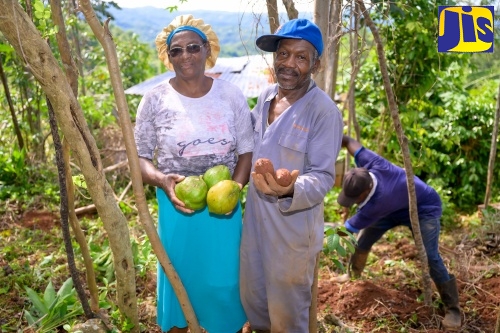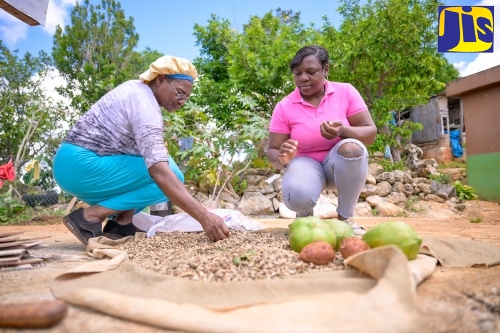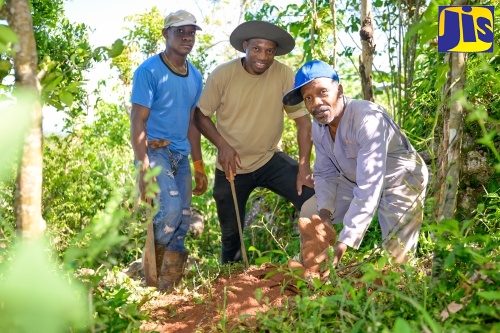Farming A Generational Legacy For The White Family
By: , April 20, 2025The Full Story
Farming for the White family is more than a career choice, it is a tradition that has been passed down through the generations, and practices evolved with the availability of information.
Patriarch Clarence White was exposed to farming around age eight when he would help his father in his yam field, and his mother with carrying out and feeding the goats.
Years later in December 1985, Clarence married Thelma, who was from a similar background and loved being on the farm with her father.

She explains that during her teen years, she was mostly asked to stay in the shop that her father ran, but with her love for farming, she could not remain there.
“As a teenager, my daddy used to run one little shop, and I am the one used to be in the shop. [But] I wanted more than just helping mi daddy in the shop. Suh, mi tell mi father seh, mi want 50 weight of yam head to buy, and mi want mi own ground (field). I buy the 50 weight of yam head and give mi big brother, and him plant 18 hills of yam,” Mrs. White recalls.
She said she cherished her little yam farm and would steal away from the shop to check on it and plant corn and peas around the yam hills.
She would do the same with her husband on his farm where they plant yam as the main crop but also plant carrot, cabbage, callaloo, pak choi among other things. They are also involved in poultry and livestock farming as they have pigs and goats on the farm.
“Mi just love mi farming. And mi still do mi little farming, even though mi sick,” Mrs. White says, disclosing that she has a heart condition.
Together, Mr. and Mrs. White have eight children— six girls and two boys— all of whom have followed in their parents’ footsteps in varied aspects.
“You know, all of them touch farming though. Because who may not have a big farm now, they still have something behind us farming,” Mrs. White says during a recent visit to their home in Craighead, Manchester.

The eldest boy, Orando White explains that growing up in a household of farmers, it was expected that the children would help in the field.
“Growing up, it’s automatic that you’re a part of the farm. You have the animals to feed, you have to go to the bush with your parents sometimes, you have your duties. I never like it, [but] I had to do it,” he says.
But as he grew up, and embarked on various career paths including music, media and communication and technology, however he soon realised the benefits of agriculture.
“As a musician, I started travelling Jamaica and I started to realise that the concept of farming that I had in my head growing up, is not what is reflected when I travel around, and I meet the people who do the thing. When you go to St. Elizabeth and see the big farmers and you see the drip irrigation and the technology integrated with the farming, you start to see farming from a different angle.
“That was when I started reflecting. I said, ‘no man, something’s not right here’. Then I started to take on a career otherwise and I realise that I have a genuine love and passion for nature and agriculture,” he adds.
He went on to rubbish the belief that people who enter farming are those who have no other prospects after leaving high school.
“Because to be a farmer, you have to have a different mindset. You have to be technical with the sciences and the math and all of that. Everything comes into one within the farmer,” he argues.
He tells JIS News that his first venture into farming on his own was 2012 when he got some callaloo seeds and planted them below his house. The younger Mr. White recounts that when he returned home after a few days travelling, the plant flourished so much that he could not see the red dirt that it was planted in.
His intention of only providing callaloo to his family was not enough, and he began to sell the product during his travels for work across Jamaica for $50 per bundle.
He explains that he has also seen what agriculture can do for a family, as his parents would have used it to provide for their children, including tertiary education for those who wanted to take that route.
Sashoy White-Bailey is one of the eight siblings who chose to go to college as she always wanted to be a teacher. Despite this, she has not ventured far from agriculture, as she married a farmer.
“Well, ever since growing up I knew that I wanted to become a teacher, so I was always striving towards that. But I was never absent from farming. It’s not like I had a passion per se for it, but I was always planting things,” Mrs. White-Bailey says.
She recalls as a teen, joining with her sister and asking their mother for a small plot of land. She says she does not remember if her mother said yes to the request, but the sisters went ahead and dug five yam hills with a machete and bought cucumber seeds to plant.
“We planted our yams and stuff, because we looked forward to summer to do our own little farming to get that feeling of accomplishment. So, I remember mommy buying a pound and a half of that cucumber for me; I think we got about five pounds in total, because it never really come to perfection. So, I’ve always been planting things other than flowers,” she recalls.
She has seen the value in farming, from her years in college when she wanted a pair of shoes and without the money to purchase them, asked her father to pay her to weed his land in preparation for planting yam. She also sees the value as a mom where the proceeds from agriculture is often used to supplement her teachers’ salary.
“Sometimes, for example, like my salary, you know, I’m basically maxed out with bills. So, you have to rely now on the farming. We sent our daughter, through four years of college without borrowing a cent just from the farming. And that’s like recently,” Mrs. White-Bailey says, touting the benefits of farming.
The youngest, 20-year-old Ranoy, opted to go straight into farming with his father when he graduated from Knox College in 2022.
He tells JIS News that he considered pursuing tertiary education, and even the Farm Work Programme, which his father participated in between 1983-2000, but he soon realised that farming was the only route for him.
“I realised everything that I have, that I have power in my hands, so all I had to do was to just jump ahead [and] be on mommy and daddy’s side and push the farm. Especially [considering] the fact that in the last part of high school, mommy took sick, and she couldn’t go to the field anymore so other people had to be working it. It was a struggle for daddy alone to send me to school so when I get a little time off, I would have to jump ahead with him and try to get some of the work done,” Ranoy explains.
After leaving school, he questioned God about what career path to take but saw shortly after the blessing he already has in agriculture. Now he works on the various properties, totalling about 11 acres, that the White’s own in Craighead, Manchester.
He has also seen and experienced the various benefits of farming, including the exercise received through the physicality of the job, and his ability to produce his own food, and for others for consumption.
“For a large amount of yam, we sell to the export market, so you find like yam buyers come here and they buy yam from you. Otherwise, you have like market vendors, they will come in or we can call them, and say, ‘I have some cabbage, or I have some second yam’ and the higglers will come and buy for half price,” Ranoy said.

Second yam is the yam that is left after the ones for export are sold. These are usually sold for a lower price to local vendors.
Though the Whites have encountered issues on their farm including hurricanes, a labour shortage and difficulty accessing lands due to the hilly terrain of Manchester, they have equally experienced the vast benefits of agriculture and continue to evolve with farming practices.
This family is among the numerous farmers who should be appreciated during April as the Ministry of Agriculture, Fisheries and Mining celebrates Farmers’ Month with the ‘Thank A Farmer’ campaign.


